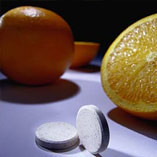Antioxidants : What Are They and How to Get Them
Free radicals are the by-product of a normal and necessary event -- the burning of oxygen by your body's cells to produce energy.
These "by-product" molecules are missing an electron, and will attack any nearby molecule get it. If they take electrons from important components in your body, like DNA, protein or fat, they do damage to those cells and precipitate health problems.
Not only that, but in the course of these exchanges a chain reaction results and new free radicals are formed, compounding the problem.
Over time, the cumulative effects of free radicals can contribute to premature aging and diseases such as artery and heart disease, arthritis, cataracts and cancer.
Free radicals can also be caused by environmental factors such as pollution, smoking and ultraviolet light.

How Antioxidants Work
Antioxidants are a group of compounds that act as free radical scavengers, donating electrons and neutralizing free radicals, preventing their damage to other cells.
They convert free radicals to harmless waste products that get eliminated from your body before they can do damage; some may even repair previous damage.
Three vitamins appear to play an important role in helping neutralize free radicals.
They are:
Vitamin C
Vitamin E
Beta-Carotene
Each vitamin has a different job to do, so it is important to have a diet rich in all of them. And, since the long-term effects of taking antioxidant supplements are still unknown and their benefits are still not proven clinically, a healthy diet is the safest, surest way.
To do battle with the ever-present free radicals, eat plenty of the following foods every day.
Beta-carotene: This antioxidant is found in intensely colored green or orange and yellow fruits and vegetables, including carrots, sweet potatoes, pumpkins, apricots, cantaloupe, mango, papaya, red bell pepper, spinach, kale, turnip greens and broccoli.
Vitamin C: Guava, papaya, red and green peppers, kiwi, orange and grapefruit juice, broccoli, cantaloupe, potatoes, tomatoes, bok choi, cabbage, strawberries, mustard and turnip greens and amaranth are great sources.
Vitamin E: Also known as tocopherol, it is found mostly in plants and is very concentrated in vegetable oils. Foods rich in vitamin E include corn oil, olive oil, peanut oil, sesame seed oil, soybean oil, sunflower oil, almonds, wheat germ, nuts, seeds, olives and margarine made from the above.
So, make sure that your lunch or dinner contains any of the antioxidant-contains food everyday ^_^.
Click here for complete article.
These "by-product" molecules are missing an electron, and will attack any nearby molecule get it. If they take electrons from important components in your body, like DNA, protein or fat, they do damage to those cells and precipitate health problems.
Not only that, but in the course of these exchanges a chain reaction results and new free radicals are formed, compounding the problem.
Over time, the cumulative effects of free radicals can contribute to premature aging and diseases such as artery and heart disease, arthritis, cataracts and cancer.
Free radicals can also be caused by environmental factors such as pollution, smoking and ultraviolet light.

How Antioxidants Work
Antioxidants are a group of compounds that act as free radical scavengers, donating electrons and neutralizing free radicals, preventing their damage to other cells.
They convert free radicals to harmless waste products that get eliminated from your body before they can do damage; some may even repair previous damage.
Three vitamins appear to play an important role in helping neutralize free radicals.
They are:
Vitamin C
Vitamin E
Beta-Carotene
Each vitamin has a different job to do, so it is important to have a diet rich in all of them. And, since the long-term effects of taking antioxidant supplements are still unknown and their benefits are still not proven clinically, a healthy diet is the safest, surest way.
To do battle with the ever-present free radicals, eat plenty of the following foods every day.
Beta-carotene: This antioxidant is found in intensely colored green or orange and yellow fruits and vegetables, including carrots, sweet potatoes, pumpkins, apricots, cantaloupe, mango, papaya, red bell pepper, spinach, kale, turnip greens and broccoli.
Vitamin C: Guava, papaya, red and green peppers, kiwi, orange and grapefruit juice, broccoli, cantaloupe, potatoes, tomatoes, bok choi, cabbage, strawberries, mustard and turnip greens and amaranth are great sources.
Vitamin E: Also known as tocopherol, it is found mostly in plants and is very concentrated in vegetable oils. Foods rich in vitamin E include corn oil, olive oil, peanut oil, sesame seed oil, soybean oil, sunflower oil, almonds, wheat germ, nuts, seeds, olives and margarine made from the above.
So, make sure that your lunch or dinner contains any of the antioxidant-contains food everyday ^_^.
Click here for complete article.


0 Comments:
Post a Comment
<< Home